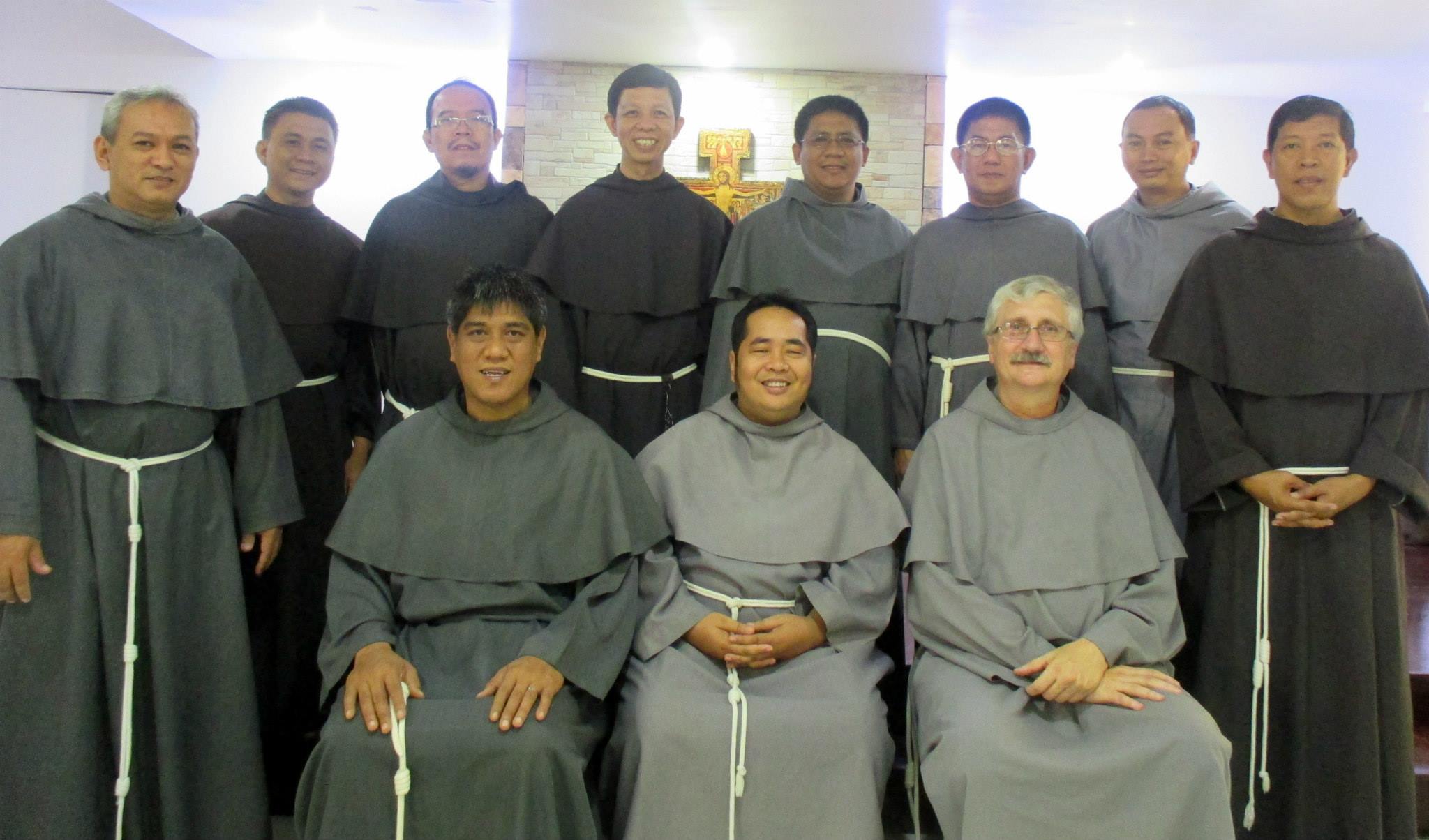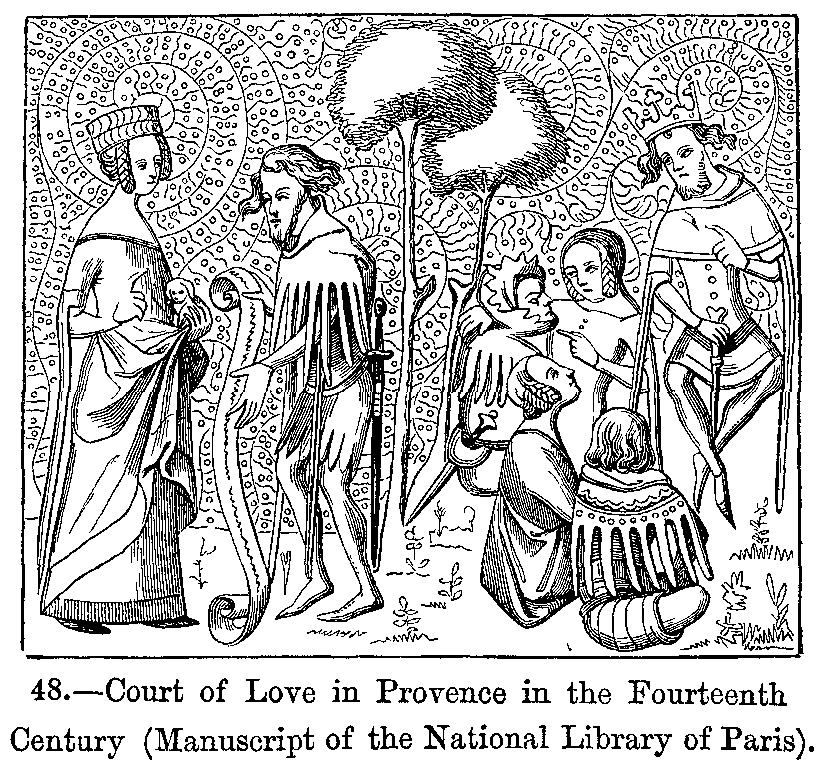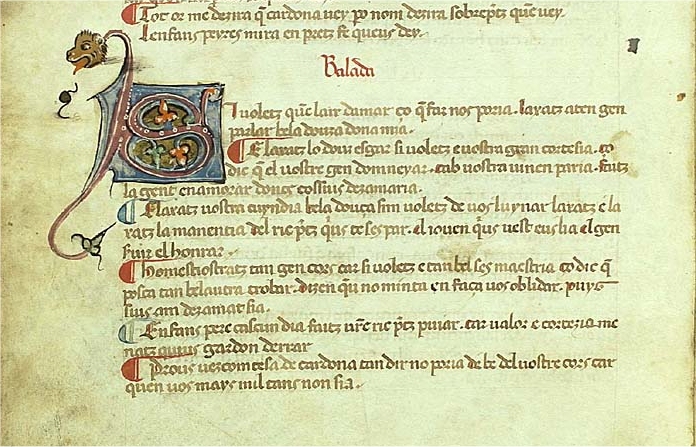|
Joan Basset
Ffra Johan Basset (, modernised as ''Fra Joan Basset'') was a Catalan author of twenty verses and a prose ''Letovari''. His work is preserved in the Cançoner Vega-Aguiló (1420–30). He was probably active in the early years (1416–21) of the reign of Alfonso V. His religious title, ''fra'' ("brother"), has led to speculation that he was a knight of the Order of Saint John of Jerusalem (based on an unsourced assertion of Jordi Rubió). Basset preached at Cervera during Lent in 1424. It is recorded that he was a member of the "Order of Santa Anna". This is probably a reference to the convent of Santa Anna at Barcelona, which was originally a house of the Order of the Holy Sepulchre under the guidance of the Patriarch of Jerusalem. Cohabitating at Santa Anna was a group of Brothers of Penitence and some Augustinian canons of Santa Eulàlia del Camp (since 1293). In 1420 the friars and canons passed into the Casa del Sant Sepulcre de Santa Anna. Basset was a competent a ... [...More Info...] [...Related Items...] OR: [Wikipedia] [Google] [Baidu] |
Friar
A friar is a member of one of the mendicant orders in the Catholic Church. There are also friars outside of the Catholic Church, such as within the Anglican Communion. The term, first used in the 12th or 13th century, distinguishes the mendicants' itinerant apostolic character, exercised broadly under the jurisdiction of a superior general, from the older monastic orders' allegiance to a single monastery formalized by their vow of stability. A friar may be in holy orders or be a non-ordained brother. The most significant orders of friars are the Dominicans, Franciscans, Augustinians, and Carmelites. Definition Friars are different from monks in that they are called to the great evangelical counsels (vows of poverty, chastity, and obedience) in service to society, rather than through cloistered asceticism and devotion. Whereas monks live in a self-sufficient community, friars work among laypeople and are supported by donations or other charitable support. Monks or nuns m ... [...More Info...] [...Related Items...] OR: [Wikipedia] [Google] [Baidu] |
Luys Ycart
Luys Ycart (fl. 1396–1433), or Lluís Icart () in modern orthography, was a Catalan poet. He left behind fourteen lyric poems and a long poem called ''Consolació i Avís d'amor'' ("Consolation and Advice of Love"). All of his poetry was produced before the composition of the chansonnier Vega-Aguiló (1420–30), into which it was copied soon after it was written. Life Luys was a minor nobleman, the son of Pere Ycart and Johanna de Subirats from Lleida. As early as 1396 he had a relationship with a woman known as Lionor de Pau. He was dubbed a knight in 1429 or 1430. He married a woman named Blanquina in an unknown year, but his four children were still young in 1433. Luys participated in the Lleidan feuds that dominated the local situation in the 1420s and 1430s. In 1430 the offenders, including Luys and his enemy Felip Claver, were fined by Queen Maria. In 1433 Maria confiscated Luys' property for his complicity in the assassination of the archdeacon of Lleida. Som ... [...More Info...] [...Related Items...] OR: [Wikipedia] [Google] [Baidu] |
Feudal
Feudalism, also known as the feudal system, was a combination of legal, economic, military, cultural, and political customs that flourished in Middle Ages, medieval Europe from the 9th to 15th centuries. Broadly defined, it was a way of structuring society around relationships derived from the holding of land in exchange for service or labour. The classic definition, by François Louis Ganshof (1944),François Louis Ganshof (1944). ''Qu'est-ce que la féodalité''. Translated into English by Philip Grierson as ''Feudalism'', with a foreword by F. M. Stenton, 1st ed.: New York and London, 1952; 2nd ed: 1961; 3rd ed.: 1976. describes a set of reciprocal legal and Medieval warfare, military obligations of the warrior nobility and revolved around the key concepts of lords, vassals, and fiefs. A broader definition, as described by Marc Bloch (1939), includes not only the obligations of the warrior nobility but the obligations of all three estates of the realm: the nobility, the cl ... [...More Info...] [...Related Items...] OR: [Wikipedia] [Google] [Baidu] |
Troubadour
A troubadour (, ; ) was a composer and performer of Old Occitan lyric poetry during the High Middle Ages (1100–1350). Since the word ''troubadour'' is etymologically masculine, a female equivalent is usually called a ''trobairitz''. The troubadour school or tradition began in the late 11th century in Occitania, but it subsequently spread to the Italian and Iberian Peninsulas. Under the influence of the troubadours, related movements sprang up throughout Europe: the Minnesang in Germany, '' trovadorismo'' in Galicia and Portugal, and that of the trouvères in northern France. Dante Alighieri in his '' De vulgari eloquentia'' defined the troubadour lyric as ''fictio rethorica musicaque poita'': rhetorical, musical, and poetical fiction. After the "classical" period around the turn of the 13th century and a mid-century resurgence, the art of the troubadours declined in the 14th century and around the time of the Black Death (1348) and since died out. The texts of troubado ... [...More Info...] [...Related Items...] OR: [Wikipedia] [Google] [Baidu] |
Courtly Love
Courtly love ( ; ) was a medieval European literary conception of love that emphasized nobility and chivalry. Medieval literature is filled with examples of knights setting out on adventures and performing various deeds or services for ladies because of their "courtly love". This kind of love was originally a literary fiction created for the entertainment of the nobility, but as time passed, these ideas about love spread to popular culture and attracted a larger literate audience. In the High Middle Ages, a "game of love" developed around these ideas as a set of social practices. "Loving nobly" was considered to be an enriching and improving practice. Courtly love began in the ducal and princely courts of Aquitaine, Provence, Champagne, ducal Burgundy and the Norman Kingdom of Sicily at the end of the eleventh century. In essence, courtly love was an experience between erotic desire and spiritual attainment, "a love at once illicit and morally elevating, passionate and disc ... [...More Info...] [...Related Items...] OR: [Wikipedia] [Google] [Baidu] |
Pere March
Pere March ( — 7 June 1413) was a Valencian poet. He was the father of Ausiàs March and the uncle of Arnau March. Pere's family had been lawyers and officers of the court of the Crown of Aragon. Born in Valencia, he was seemingly the younger brother of Jaume March II, and the family's possessions around Barcelona passed to Jaume. Pere served at the court of the younger brother of King Alfonso IV, Peter, seneschal of Catalonia, and then at the court of Peter's son Alfonso, Duke of Gandia, and of Alfonso's son Alfonso. He undertook several important diplomatic missions, travelling to England for the first Alfonso twice in the 1380s, and then working for the second during the interregnum following the death of King Martin I. For his services, Pere was knighted. After his death at Balaguer in 1413, his body was moved and buried in the Monastery of Sant Jeroni de Cotalba, in Alfahuir, (Valencia).Source: Las Provincias ''Las Provincias'' is a regional newspaper published in V ... [...More Info...] [...Related Items...] OR: [Wikipedia] [Google] [Baidu] |
Cerverí De Girona
Cerverí de Girona (; fl. 1259 – 1285) was a Catalan troubadour born Guillem de Cervera in Girona. He was the most prolific troubadour, leaving behind some 114 lyric poems among other works, including an ''ensenhamen'' of proverbs for his son, totaling about 130. He was a court poet to James the Conqueror and Peter the Great. He wrote '' pastorelas'' and '' sirventes'' and his overriding concern was the complexities of court life. None of his music survives. Cerverí spent some time under the patronage and at the court of Hugh IV and Henry II of Rodez. He was in Spain in 1269, for he is found that year in the entourage of the then-''infante'' Peter the Great. With fellow troubadours Folquet de Lunel and Dalfinet he accompanied Peter to Toledo. On 26 April at Riello, near Cuenca, he received one '' solidus'' for his services. Cerverí's ' ("Verse in six languages") copied the metre of either Folquet's ' or Sordel's '. Cerverí wrote ', a '' planh'', on 26 August 127 ... [...More Info...] [...Related Items...] OR: [Wikipedia] [Google] [Baidu] |
Canso (song)
The ''canso'' or ''canson'' or ''canzo'' () was a song style used by the troubadours. It was, by far, the most common genre used, especially by early troubadours, and only in the second half of the 13th century was its dominance challenged by a growing number of poets writing ''coblas esparsas''. The ''canso'' became, in Old French, the ''grand chant'' and, in Italian, the ''canzone''. Structure A ''canso'' usually consists of three parts. The first stanza is the ''exordium'', where the composer explains his purpose. The main body of the song occurs in the following stanzas, and usually draw out a variety of relationships with the ''exordium''; formally, aside from the ''envoi''(''s''), which are not always present, a ''canso'' is made of stanzas all having the same sequence of verses, in the sense that each verse has the same number of metrical syllables. This makes it possible to use the same melody for every stanza. The sequence can be extremely simple, as in ''Can vei la l ... [...More Info...] [...Related Items...] OR: [Wikipedia] [Google] [Baidu] |
Sant Climent De Taüll
Sant may refer to: People * Alfred Sant (born 1948), Maltese politician * Andrew Sant (born 1950), English-born Australian poet * David Sant (born 1968), Catalan director, actor and writer * Indira Sant (1914–2000), Indian poet * James Sant (1820–1916), British painter * Lorry Sant (1937–1995), Maltese politician Places * Sant State, a former princely salute state in Rewa Kantha, Gujarat, India * Sant, Övörkhangai, a district in Mongolia * Sant, Selenge, a district in Mongolia * Șanț, a commune in Bistriţa-Năsăud County, Romania * Șanț River, a tributary of the Trotuş River in Romania Religion * Sant (religion), in Hinduism, Jainism, and Buddhism, an enlightened human being, commonly translated as "Saint" * Sant Joan (other) Other * Sant (card game), an early name for the game of Piquet * Sant tree (''Acacia nilotica''), a tree species found in Africa * Teniente General Benjamín Matienzo International Airport, Argentina (ICAO code: SANT) S ... [...More Info...] [...Related Items...] OR: [Wikipedia] [Google] [Baidu] |
Incipit
The incipit ( ) of a text is the first few words of the text, employed as an identifying label. In a musical composition, an incipit is an initial sequence of Musical note, notes, having the same purpose. The word ''incipit'' comes from Latin and means "it begins". Its counterpart taken from the ending of the text is the Explicit (text), explicit. Before the development of title (publishing), titles, texts were often referred to by their incipits, as with for example ''Agnus Dei (liturgy), Agnus Dei''. During the medieval period in Europe, incipits were often written in a different Typeface, script or colour from the rest of the work of which they were a part, and "incipit pages" might be heavily decorated with Illuminated manuscript, illumination. Though the word ''incipit'' is Latin, the practice of the incipit predates classical antiquity by several millennia and can be found in various parts of the world. Although not always called by the name of ''incipit'' today, the practi ... [...More Info...] [...Related Items...] OR: [Wikipedia] [Google] [Baidu] |
Manuel Milà I Fontanals
Manuel Milà i Fontanals (; May 4, 1818 – July 16, 1884) was a Spanish scholar. He was born at Vilafranca del Penedès, near Barcelona, and was educated first in Barcelona, and afterwards at the University of Cervera. In 1845, he became professor of literature at the University of Barcelona, and held this post until his death at Vilafranca del Penedès on the July 16, 1884. The type of the scholarly recluse, Milà i Fontanals was almost unknown outside the walls of the university until 1859, when he was appointed president of the ''jocs florals Floral Games were any of a series of historically related poetry contests with floral prizes. In Occitan, their original language, and Catalan they are known as (, ; modern or ). In French, they became the (), and in Basque (). The origina ...'' at Barcelona. On the publication of his treatise, ''De Los trovadores en España'' (1866), his merits became more generally recognized, and his monograph, ''De la poesía heróico-pop ... [...More Info...] [...Related Items...] OR: [Wikipedia] [Google] [Baidu] |




